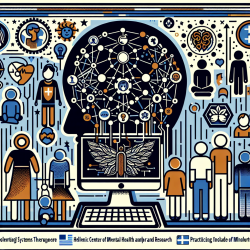GST, as introduced by Ludwig von Bertalanffy, offers a comprehensive framework for understanding the complex interactions within mental health systems. This approach was applied to the Hellenic Center of Mental Health and Research (HCMHR) to better understand the relationships between service provision and operational capability. The study revealed several key insights that can be invaluable for practitioners.
Key Findings and Implementation Strategies
- Multidisciplinary Approach: The study emphasizes the importance of a multidisciplinary approach in treating mental health issues. Practitioners should collaborate with various specialists, including pediatric psychiatrists, psychologists, social workers, and speech therapists, to provide comprehensive care.
- Operational Framework: GST helps in identifying the operational capabilities of mental health centers. By understanding the flow of patients and the interactions between different services, practitioners can better manage resources and improve service delivery.
- Evidence-Based Practices: The study highlights the need for evidence-based practices in mental health care. Practitioners should utilize data-driven methods to assess the effectiveness of treatment plans and make necessary adjustments.
- Cultural Sensitivity: The research underscores the importance of considering cultural and social factors in treatment. Practitioners should be aware of the diverse backgrounds of their patients and tailor their approaches accordingly.
For practitioners in online therapy, these findings can be particularly useful. Implementing a GST framework can help in understanding the complexities of remote service delivery and improving patient outcomes. Here are some steps to get started:
Steps for Implementation
- Adopt a Multidisciplinary Approach: Collaborate with other specialists through online platforms to provide a holistic treatment plan for your patients.
- Utilize Data-Driven Methods: Use data analytics tools to monitor patient progress and adjust treatment plans based on evidence.
- Be Culturally Sensitive: Ensure that your treatment approaches are inclusive and considerate of the cultural backgrounds of your patients.
- Continuous Learning: Stay updated with the latest research and integrate new findings into your practice.
By incorporating these strategies, practitioners can significantly enhance the quality of care they provide, leading to better outcomes for children and adolescents with mental health issues.
To read the original research paper, please follow this link: Applying a general systems theory framework in mental health treatment pathways: the case of the Hellenic Center of Mental Health and Research.










